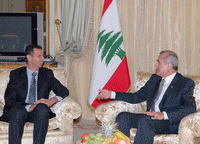An increasingly vicious battle that has broken out between pro- and anti-Syrian factions in Lebanon is likely to determine the country's ability to resist Syrian interference in its internal politics.
Also at stake in the conflict is the future of a United Nations investigation into the 2005 assassination of former Lebanese Prime Minister Rafik Hariri. The assassination sparked a protest movement that blamed Syria for Hariri's killing and forced Damascus to withdraw its troops after a nearly 30-year presence in Lebanon. The anti-Syrian groundswell paved the way for Saad Hariri, Rafik Hariri's son, to become prime minister. Syria and its ally, the Shiite militia Hezbollah, have both denied involvement in the former prime minister's death.
The latest battle erupted when Saad Hariri refused to cave in to demands by Hezbollah and Syria to withdraw his support for the U.N. investigation, which has polarized Lebanese politics from the outset. Syrian Foreign Minister Walid Moallem cautioned U.S. Secretary of State Hillary Clinton in a meeting in New York on Monday that Syria would oppose the issuing of indictments by the U.S.-backed U.N. Special Tribunal on Lebanon (STL). Speaking after the meeting, Moallem charged that the tribunal had been irredeemably "politicized" and risked plunging Lebanon into a new round of sectarian strife.

